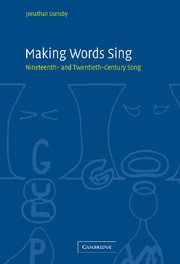Book contents
- Frontmatter
- Contents
- Acknowledgements
- Introduction
- 1 An introduction with no words, with intended words, and untheory
- 2 A love song: Brahms's ‘Von ewiger Liebe’
- 3 Boundless opulence: postscripts on Schoenberg's premonition
- 4 Interlude on peace, laws, flowers, and men flying
- 5 To Amherst via Vienna
- 6 By way of brief conclusion
- Bibliography
- Index
2 - A love song: Brahms's ‘Von ewiger Liebe’
Published online by Cambridge University Press: 23 November 2009
- Frontmatter
- Contents
- Acknowledgements
- Introduction
- 1 An introduction with no words, with intended words, and untheory
- 2 A love song: Brahms's ‘Von ewiger Liebe’
- 3 Boundless opulence: postscripts on Schoenberg's premonition
- 4 Interlude on peace, laws, flowers, and men flying
- 5 To Amherst via Vienna
- 6 By way of brief conclusion
- Bibliography
- Index
Summary
‘You'd think that people would have had enough’ – wrote Paul McCartney, and more to the point he sang with his group Wings on record, in 1976, becoming an overnight world success – ‘of silly love songs’. Enough of love songs; it's quite a thought. Whether one should be quoting a popular singer on the subject is open to question, scholarly question that is, in a study centring on Brahms; while on the other hand one imagines that if anyone is qualified to comment on song at least in the later twentieth century, it ought to be someone like McCartney who was the era's most globalized writer and performer of song. ‘Classical’ his song world may not be, but representative of the most widespread and highly valued form of vocality it certainly was.
Admittedly there is something painfully overindulgent in taking too forensic a view of popular culture – not that it fails to be as significant as any other kind of art, and from many points of view it is among the most important expressions of human sentiment, if important means sincere and, in the age of technology, truly widely shared, art of the people if ever there was one. It is always difficult to wonder how to evaluate the fleetingly memorable (deeply though popular art penetrates into our psyche) in comparison with art designed to be lasting; all too easy to give in to some form of cultural imperialism when we compare a work of supposedly ‘high’ art with something perceived to be its opposite – popular, improvisatory perhaps, laden with reference so contemporaneous that it is dated almost the moment it is produced, and in short therefore, dare one even write it, ‘low’.
- Type
- Chapter
- Information
- Making Words SingNineteenth- and Twentieth-Century Song, pp. 33 - 56Publisher: Cambridge University PressPrint publication year: 2004



